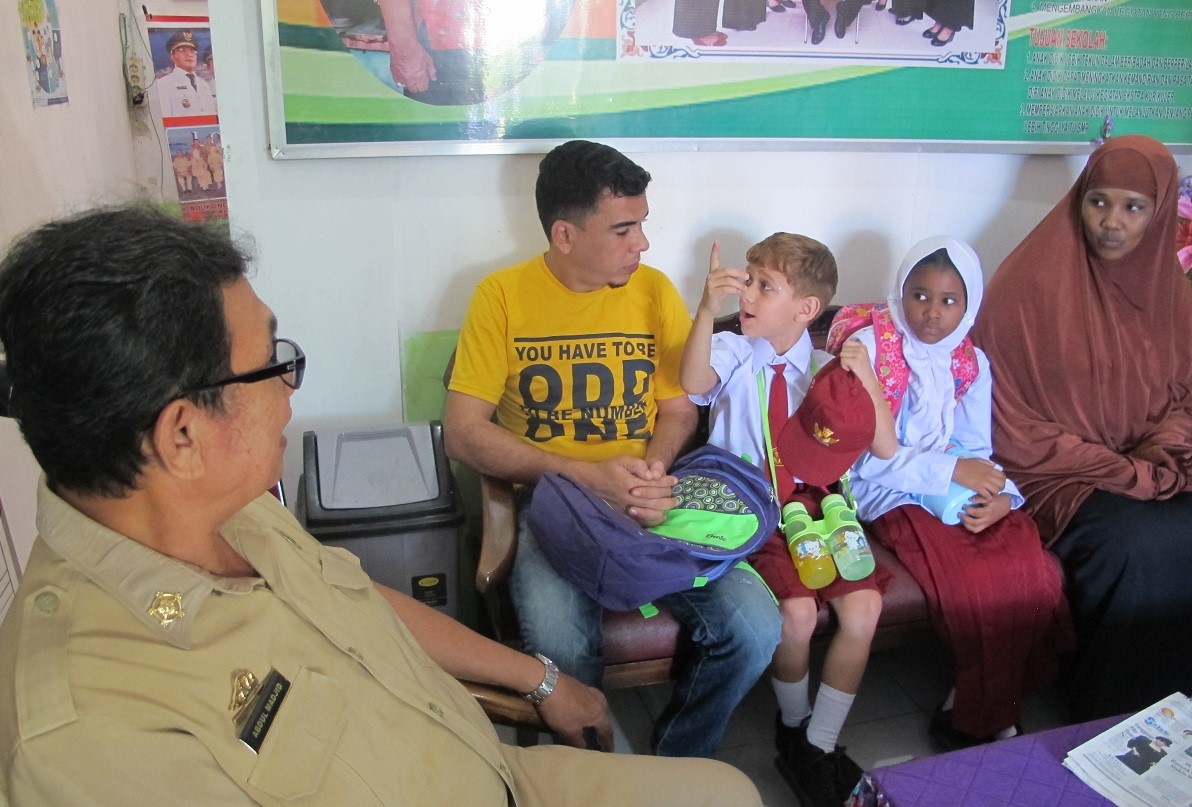It was Monday morning when staff members of UNHCR and the International Organization for Migration (IOM) arrived at SD Jongaya public elementary school, which is situated near a refugee accommodation in Makassar, South Sulawesi. On that day, four refugee children began their schooling for the first time since their arrival in Indonesia. They looked very excited as they passed through the school gate.

Principal of Public School Jongaya, Mr. Abdul Majid (left), welcomes refugee children and their parents in his office.
Clad in new school uniforms, the children ranging in age from 7 to 11 arrived to the school with their parents. Although they seemed to be a bit nervous, they looked very happy. Hamid (not his real name), looked sharp with his hair slicked back, while the girls – Ana, Aisha and Sadia (not their real names) were also neatly dressed and wearing hijabs.
With their big smiles, Aisha and her sister Sadia expressed their excitement about going to school that day. “Alhamdullilah [Thank God], we can go back to school after waiting for a long time”, Aisha told UNHCR.
The children and their parents were warmly welcomed by Principal Abdul Majid, who later introduced them to students and teachers during a flag ceremony. After assessing the refugee children’s ages and educational backgrounds, Mr. Majid made a quick decision on the suitable grades for the refugee children. He later escorted them to their classes to meet their new classmates after the flag ceremony.
“They have been out of school for a long time,” said Mr. Madjid. “We’re trying to help close that gap by ensuring the students enter the grade level according to their ages so that they’re not set back to the time they’ve missed in school.”
The Makassar city administration has pledged its commitment to support the enrolment of refugee children to public schools in Makassar. This is in line with Indonesia’s commitment to provide a primary education to all children on its territory as a state party to the Convention on the Rights of the Child. UNHCR is working with the Government, IOM and other partners in Makassar as well as in other cities in Indonesia to help refugee children enrol in public schools where they receive accreditation for their schooling.
Mr. Majid said that he was happy to welcome the refugee children to enjoy basic education in his school. “We have no problem to accept them, because we have no right to refuse children who want to learn; moreover their background as refugees makes them very vulnerable,” Mr. Majid went on. “Hopefully, our children can also understand about humanity and be grateful for their situation in Indonesia where children can still go to school safely,” he added.
He also explained he believes education is crucial since it can foster social cohesion, provide access to life-saving information, address psychosocial needs and offer a stable and safe environment for the children. Education also helps children to feel they are part of their communities and pursue productive and meaningful lives.

A pupil at SD Jongaya happily introduces herself to a new refugee classmate (right).
For many refugee children, the lack of Bahasa Indonesia language skills is a major obstacle to attend public schools, while those who can speak the language may still have difficulties in writing and reading due to differences between Bahasa Indonesia and the alphabet of their mother tongue. To deal with this issue at SD Jongaya, Mr. Majid said the teachers will lend a hand to help the refugee children learn Bahasa Indonesia. Moreover, UNHCR also communicates regularly with the parents to monitor the refugee children’s progress in school.
UNHCR is working with Mr. Majid to organize a session to share information about refugees with the school’s teachers and students. This will serve to raise awareness about refugees and the circumstances that force them to seek safety in other countries like Indonesia. The proposal was welcomed by Mr. Majid. Books and videos on refugee-related issues, Mr. Majid said, will help increase the students’ knowledge about refugees.
UNHCR continues to work together with IOM and other partners such as Dompet Dhuafa and the National Red Cross to ensure that refugee children learn Bahasa Indonesia well enough to be able to enrol in the country’s public schools.
Share on Facebook Share on Twitter